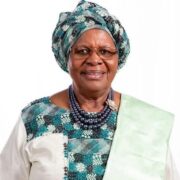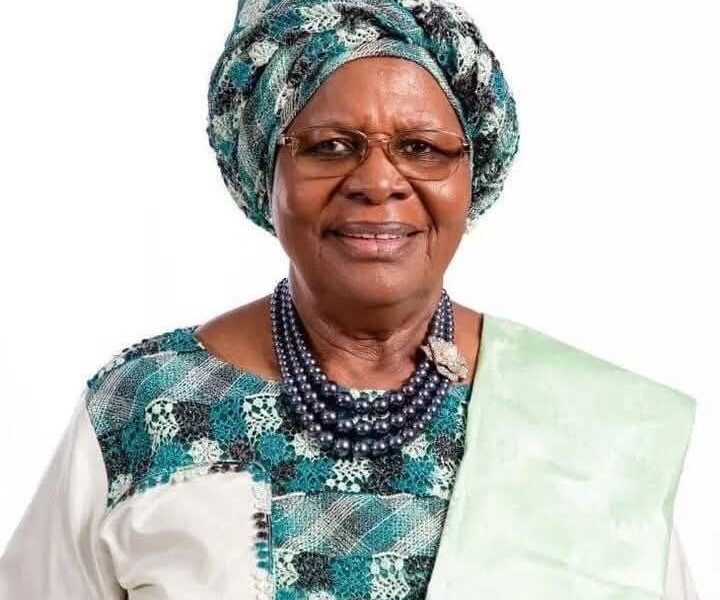
Before assuming the presidency, Nandi-Ndaitwah served as Namibia’s vice president for a year. She is a long-standing member of the South West Africa People’s Organisation (SWAPO), the party responsible for leading the nation to independence from apartheid South Africa in 1990.
The ceremony took place at State House, relocated from the Independence Stadium due to heavy rains, marking both her inauguration and the 35th anniversary of Namibia’s independence. Outgoing President Nangolo Mbumba, 83, officially transferred power to Nandi-Ndaitwah, who was greeted with applause and cheers from the crowd as she took the oath of office.
In the controversial November elections, which were delayed multiple times due to logistical issues, Nandi-Ndaitwah secured 58% of the vote. Her win was hailed by many as a momentous achievement for Namibian women and Africa as a whole.
“We are witnessing a historic moment,” President Mbumba remarked, noting that Namibia was finally seeing one of its own rise to the highest office. “It’s been a long time coming.”
Monica Geingos, a businesswoman and wife of the late President Hage Geingob, expressed her excitement, calling it a monumental day for Africa. “She will continue to inspire young women everywhere,” Geingos said.
Former South African Deputy President Phumzile Mlambo-Ngcuka also celebrated the event, describing Nandi-Ndaitwah as a role model for women across generations. “This is a victory for women everywhere—especially young African women who dream of making a difference,” she added.
Reactions from notable Nigerians have also echoed support for Nandi-Ndaitwah’s victory. Nigerian feminist, activist, and writer Chimamanda Ngozi Adichie praised the new president, calling it “a significant moment in Africa’s journey toward gender equality.” She continued, “We must celebrate women who break barriers and pave the way for others to follow. Nandi-Ndaitwah’s achievement shows that African women are capable of leading at the highest levels.”
Former Nigerian President Olusegun Obasanjo also joined in congratulating the new president. “This is a great day for Namibia and Africa,” Obasanjo said. “It is a symbol of progress and proof that leadership is not defined by gender. Netumbo Nandi-Ndaitwah’s ascent to the presidency is a historic moment not just for Namibia but for the entire continent.”
Despite a strong challenge from the youth-driven opposition group, the Independent Patriots for Change (IPC), which secured 25.5% of the vote, SWAPO remains deeply popular in Namibia. Unemployment among young people, however, remains a pressing issue, with 44% of individuals aged 18 to 34 jobless in 2023, a critical concern for Nandi-Ndaitwah.
The new president highlighted tackling unemployment as one of her top priorities. “In the next five years, we must create at least 500,000 jobs,” she said, stressing the need for an investment of 85 billion Namibian dollars ($4.67 billion). Agriculture, fishing, and the creative and sports industries are expected to be central to this job creation effort.
Nandi-Ndaitwah, who has a background in the Anglican Church, is known for her conservative views, including her opposition to abortion and gay marriage, both of which remain illegal in Namibia.
As a SWAPO member since her youth, Nandi-Ndaitwah spent part of her early life in exile in Moscow, participating in the struggle for Namibia’s independence. Her tenure as foreign minister from 2012 to 2024 saw her praising Namibia’s diplomatic ties, including its relationship with North Korea.
Namibia is one of the world’s leading producers of natural uranium, used for nuclear energy production in countries like France. The country, rich in natural resources such as diamonds, uranium, and potential oil and gas reserves, is set to continue its efforts to harness its economic assets under Nandi-Ndaitwah’s leadership.
While Nandi-Ndaitwah’s election has been lauded as a historical and symbolic victory for women, it is not without its challenges. Her administration faces significant economic issues, particularly the rising youth unemployment rate and the country’s reliance on resource extraction. Moreover, her conservative views on issues like LGBTQ rights may spark debate as Namibia becomes more integrated into the global dialogue on human rights and social justice.
The success of her presidency will likely hinge on her ability to balance the demands of modernization with the conservative values of her party and the country. Many are watching closely to see how she addresses these challenges and steers Namibia into its next phase of development.
As the first female president of Namibia, Nandi-Ndaitwah’s legacy will likely be shaped not only by her political acumen but expectations are that it should also be shaped by her ability to empower the marginalized, including women, youth, and rural communities. Her leadership could be a catalyst for transformative change across southern Africa and beyond.
As Toun Okewale Sonaiya the CEO of Women Radio 91.7fm puts it, her new position as president is ‘a victory for women everywhere’.

